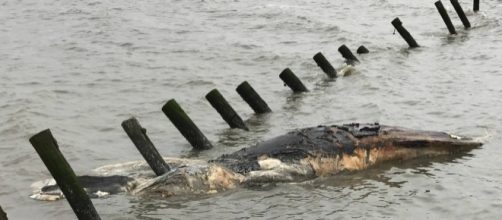The deaths of at least forty-one humpback whales have been reported in the past 15 months along the Atlantic Coast from North Carolina to Maine. Ten of the carcasses display physical injuries probably from a collision with some heavy object like a ship, and marine biologists appear to be clueless on the subject. Officials of the National Oceanic and Atmospheric Administration Fisheries (NOAA) are inquiring into these deaths.
Probable reasons
According to New York Times, on average eight humpback whales get stranded every year from the stretch of Maine to Virginia, but incidents of being hit by ships are rare.
However, in the present case, many of them reveal evidence of injuries that appear to have been inflicted by the propeller of the ships which has got the Marine Biologists worried.
In the opinion of Dr. Deborah Fauquier, a veterinary medical officer at the agency’s Office of Protected Resources, collision with ships off the Atlantic coast were events that could have led to death. The matter is being investigated accordingly. She feels that stranding of a large number of whales is a matter of concern, and an investigation could shed light on the nature of the threat. This will help scientists to devise some preventive actions.
Is it related to ecological balance?
Humpback whales can attain a length of 60 feet, weigh as much as 40 tons, can survive for 50 years, and are found in all the oceans.
The unnatural deaths of marine animals is a mystery, and when the numbers involved are unnaturally high, questions are bound to arise. Officials from NOAA Fisheries are unable to explain why these whales were inviting physical injuries by getting close to the vessels. Was any external factor responsible for their odd behavior? Did humans have a role to play, or was it some climate-related disturbance?
The carcasses of ten whales other than those killed by ships have been examined, and the cause is yet to be ascertained. But one thing is certain – they did not die from any disease. It is a mystery to marine biologists. Apparently, this cannot be taken lightly, and it could point to a disturbance of the ecological balance.
One line of thinking is that the whales were disoriented because of marine noise emanating from factors like military activity, offshore drilling, or exploration.
The point to be noted is that these whales and shipping vessels have been co-existing in the Atlantic coast for ages, and such incidents have never been reported earlier. Therefore, a thorough investigation must be carried out to establish the cause. Global warming is a phenomenon that has been a major worry for environmentalists and is yet to be understood in its totality. It is possible that global warming has disturbed the food system of marine animals like the whales, which force them to venture into dangerous waters in search of food and collide against the ships.

